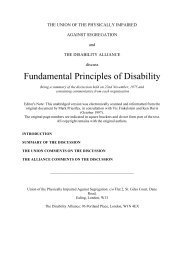Global-Report-Living-Colour-dr2-2
Global-Report-Living-Colour-dr2-2
Global-Report-Living-Colour-dr2-2
You also want an ePaper? Increase the reach of your titles
YUMPU automatically turns print PDFs into web optimized ePapers that Google loves.
76<br />
Inclusive Communities = Stronger Communities<br />
GLOBAL REPORT ON ARTICLE 19: THE RIGHT TO LIVE AND BE INCLUDED IN THE COMMUNITY<br />
KENYA “The community doesn’t pay<br />
me any attention. Often when there is<br />
a big event like a wedding or funeral<br />
my family is not told about it even<br />
though we would like to be included. I<br />
think they don’t like me because I am<br />
often hungry and ask for food.”<br />
communities was poverty. While we heard about<br />
the issues of poverty from families and self-advocates<br />
across all countries, poverty in low-income countries<br />
was especially definative of the exclusion which<br />
individuals and families faced in their communities.<br />
For families who are poor the added cost of caring for<br />
a family member with a disability coupled with the<br />
need for someone (almost always the mother) to stay<br />
home and therefore not work results in extreme<br />
poverty.<br />
Additionally, employment options for people with<br />
intellectual disabilities continue to be extremely<br />
limited and programmes that provide segregated day<br />
centres and sheltered workshops do not provide<br />
financial compensation. Where there are people with<br />
intellectual disabilities working it tends to mirror the<br />
activities of the family (for example cattle, agriculture<br />
etc.)<br />
‰ Invisibility<br />
SWAZILAND The latest Swaziland<br />
census of 2007 has statistics of people<br />
with all disabilities except that of<br />
people with intellectual disabilities. The<br />
disability grant of E250 (approximately<br />
USD 30) that people with disabilities<br />
who are registered receive every three<br />
months, is not given to those with<br />
intellectual disabilities.<br />
Even in countries which have ratified the CRPD, it is<br />
clear from our members surveyed that governments<br />
and society in general do not include people with<br />
disabilities in their national plans for health,<br />
education, transportation or employment. Supports<br />
and services for people with disabilities where they<br />
exist tend to focus on aids and devices for physical<br />
and sensory disabilities. Over and over we heard that<br />
even within the disability movement people with<br />
intellectual disabilities were invisible in societal<br />
processes and in government policy and planning.<br />
In Africa, over 15 million people are believed to have<br />
intellectual disabilities and the majority live in abject<br />
poverty, neglect and social isolation. Many more are<br />
victims of catastrophic human rights violations. The<br />
most marginalised underclass lives in the remotest,<br />
most isolated places in Africa, with hardly any safety<br />
nets. They are always at the bottom of the pile, even<br />
within the disability movement. The few national



